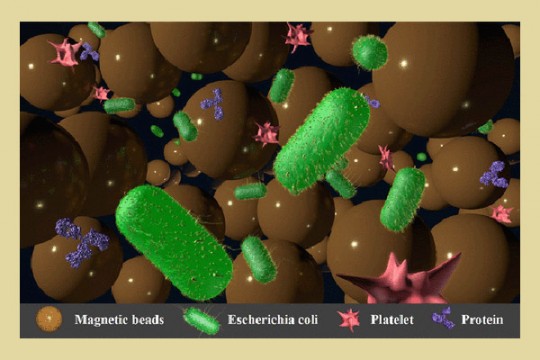News
Department of Biomedical Engineering
-
April 20, 2020
![illustration of coronavirus.]()
RIT Rallies: Alumnae contributed to antibody test recently launched by Ortho Clinical Diagnostics
Maria Romero-Creel ’17 (biomedical engineering) and Wendy Salamone ’10 (biotechnology) are just two of the people responsible for the analyzer database update launched by Ortho Clinical Diagnostics on April 14. The team is responsible for ensuring that calibrations, precision fluid information and analyzer settings for new assays like COVID-19 are properly entered and working for analyzers in the field.
-
April 15, 2020
![An enlarged image of the different bioparticles found in a specimen.]()
RIT researchers build micro-device to detect bacteria, viruses
Ke Du and Blanca Lapizco-Encinas, both faculty-researchers in RIT’s Kate Gleason College of Engineering, worked with an international team to collaborate on the design of a next-generation miniature lab device that uses magnetic nano-beads to isolate minute bacterial particles that cause diseases. This new technology improves how clinicians isolate drug-resistant strains of bacterial infections and difficult-to-detect micro-particles such as those making up Ebola and coronaviruses.
-
February 20, 2020
![student fitting miniature donkey with 3D-printed horseshoe.]()
Saler’s new 3D-printed shoes
Saler, a miniature donkey, received new, 3D-printed shoes this past weekend at Karen and Bob Pinkney’s Wychmere Farms in Ontario, N.Y. RIT biomedical engineering students were among the unlikely team brought together to help the 9-month-old little donkey whose tendons did not develop properly in his front legs.
-
February 10, 2020
![reseachers looking into microscopes with results showing on TV screen.]()
In Focus: Biomedical engineering students help advance digital microscope technology
Biomedical engineering students Brandon Buscaglia and Marcus D’Aguiar are helping physicians see the invisible. The undergraduates developed a motorized stage and tracking prototype that works in conjunction with digital microscopes. The students’ ideas are being incorporated into a company’s tech offerings today, providing the potential to make an impact in health care applications tomorrow.
-
December 15, 2019
![student presenting poster.]()
Students address challenges in RIT Grand Challenges Scholars Program
Ridding waterways of microplastics, delivering water to remote villages experiencing drought, and better ways to remove salt from water were just a few of the clean-water research projects recently presented by undergraduate students as part of RIT’s Grand Challenge Scholars program.
-
August 23, 2019
![Professor in lab holding pipette.]()
RIT professor named to IAspire Leadership Academy
Blanca Lapizco-Encinas, professor of biomedical engineering in RIT’s Kate Gleason College of Engineering, was named a Fellow in the inaugural cohort of the I Aspire Leadership Academy. This leadership program aims to help STEM faculty from underrepresented backgrounds attain leadership roles at colleges and universities.
-
August 7, 2019
![Overhead view of crowd of people in building lobby.]()
RIT undergraduates share cutting-edge research at annual summer symposium
The 28th annual Undergraduate Research Symposium, held on Aug. 1, is structured as a professional research conference. Research themes included everything from fundamental microbiology to the fine arts.
-
August 6, 2019
![Student in lab coat works with pipette.]()
RIT expands genomics research
RIT’s genomics research capabilities have evolved significantly over the past year. The university has invested heavily in revamping and equipping its Genomics Research Lab Cluster. The overhauled genomics facilities will boost capabilities for researchers in multiple disciplines, including bioinformatics, biotechnology and environmental science.
-
July 24, 2019
![College student shows child an assembly line with Lego pieces.]()
Kate Gleason College of Engineering recognized for diversity and inclusion initiatives
Engineers today must be able to manage technical aspects of projects but also work effectively in a diverse, multi-cultural workplace. RIT is preparing its engineering graduates for those growing demands and was recognized by the American Society of Engineering Education as part of its national commitment to improve diversity within university engineering programs.
-
July 12, 2019
![Woman wearing black blouse sits in front of desk with computer.]()
Professor honored with Presidential Early Career Award for Scientists and Engineers
RIT computing professor Linwei Wang, whose research is advancing non-invasive personalized healthcare for heart diseases, is receiving the Presidential Early Career Award for Scientists and Engineers, the highest honor bestowed by the U.S. government on outstanding scientists and engineers who are beginning their independent research careers and show exceptional promise for leadership in science and technology.
-
June 24, 2019
![Two students and a professor work on a computer with infrared imaging of cancerous tumors.]()
Infrared imaging technology being developed to better detect breast cancer
Faculty and student researchers at RIT, and physicians from the Rochester Regional Health System (RRHS), developed a non-invasive process using infrared imaging to better detect cancerous tumors.
-
May 29, 2019
![Two head-and-shoulder shots of male researchers.]()
RIT researchers receive NSF award to develop new diagnostic tool for cardiac disease
Researchers at RIT are providing a better map to the human heart. They are developing a critical tool that will help clinicians identify damaged areas in the heart to more accurately diagnose cardiac disease.














